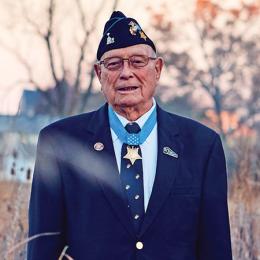Medal of Honor Recipient Hershel “Woody” Williams Visits Gettysburg

World War II Medal of Honor recipient Hershel “Woody” Williams reflects on the sense of duty felt by soldiers, whether during the Civil War or in the 20th century.
In every conflict, there are those individuals who are willing to go above and beyond the call of duty. Most of the people in America do not know that there were 64 Medals of Honor awarded at Gettysburg to volunteers. They didn’t have to do what they did, but they did it for a cause greater than themselves. Probably most of them didn’t think that they were doing anything extraordinary at all — they were fulfilling their obligation as a soldier.
I enlisted in the Marine Corps in November 1942, the month after I turned 18. I wanted to go into the Marine Corps to protect my country and my freedom. I didn’t know at that point that I would be going to a foreign country. I thought we would stay right here in the United States, to protect our country from somebody who apparently was trying to take it away from us. I didn’t even know we had a South Pacific ocean at that point in time.
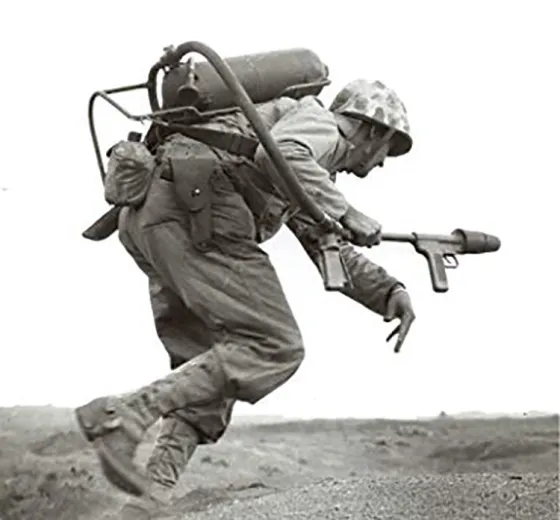
I first got to the little island of New Caledonia, then they shipped us out to Guadalcanal, where we trained on the flamethrower. Then we went to Guam and, once we secured the island, we shipped out to go to Iwo Jima. We didn’t have any intelligence about Iwo Jima. You couldn’t get anybody on the island, so we didn’t know that they had 22,000 soldiers on Iwo Jima or miles of tunnels that they’d hollowed out in the island.
On the 21st of February — that was D-Day plus two — we finally got ashore and began taking part in the combat. On the 23rd of February, the flag was raised on Mount Suribachi. I was about 1,000 yards up the island, near the first airfield. When the flag went up, they were celebrating because Old Glory was, for the first time, flying on enemy territory. I’ve read something about flags in the Civil War, and how central they were. And when that photograph, that Joe Rosenthal took, that hit the front pages of almost every newspaper in the country, that did something, I believe.
I’m thankful that our method of fighting in World War II was different, so different, than it was in the Civil War. They were shoulder to shoulder, moving forward as a total group. I am a little bit reminded of our enemy in World War II, the Japanese. Their tactics were so different from ours; if they got into a tight spot, they would do what they called banzai. They would come in a large group of people, all at one time.
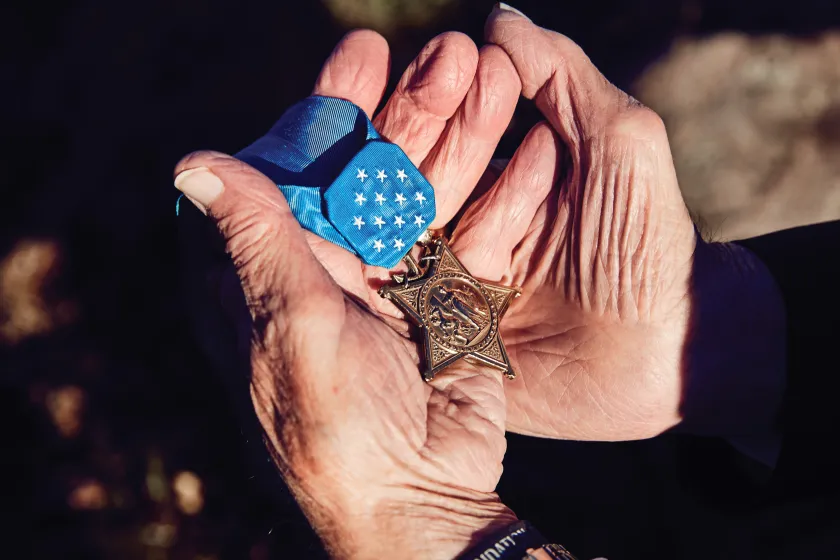
“Being at a battlefield where you know that individuals sacrificed their lives is a profound experience.”
At Gettysburg, six Medals of Honor were awarded for an action that has some parallels to my experience. We believe that a contingent of Georgians were attempting to advance from the Wheatfield and 10 or 12 took shelter in a cabin, picking off some of the Pennsylvania Reserves. And so, they decided that they had to eliminate those snipers because they were killing some of their people. So, those six guys — Chester Furman, John Hart, Wallace Johnson, George Mears, J. Levi Roush and Thaddeus Smith — volunteered and rushed the cabin, capturing the Georgians within.
On Iwo Jima, we’d attempted a number of times to break through those pillboxes, and we were losing Marines very rapidly. So, when my commanding officer asked me, as I was the last of the flamethrower operators in my company, could I do something to eliminate some of the pillboxes, that was my duty. So, they say I volunteered and, well, maybe I did. But I looked at it as a responsibility, because that’s what they trained me to do.
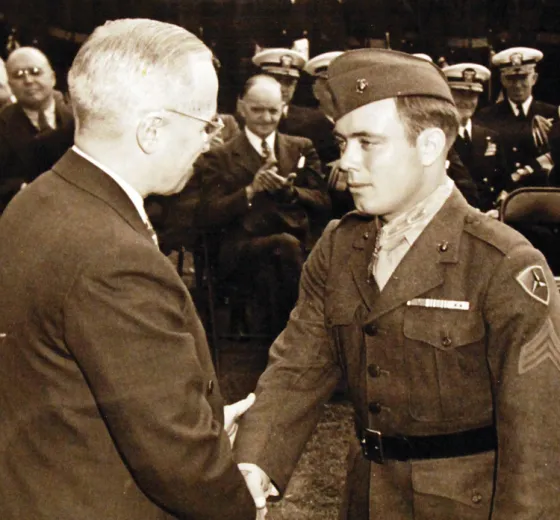
In my citation, there’s one word I would have taken out. It says, “He went forward alone.” I didn’t. I didn’t go alone. I was the only flamethrower operator, but I didn’t go forward alone because I had other Marines risking their lives to protect mine. Two of those individuals, I didn’t even know. The two who lost their lives were not part of my squad or my platoon. Where they came from, I don’t know.
I think Chester Furman and the other five individuals that had the target of the cabin, knowing that the snipers were in there, they felt a great deal like I did on Iwo Jima: that we need to eliminate them so that we can move forward, protect our buddies.
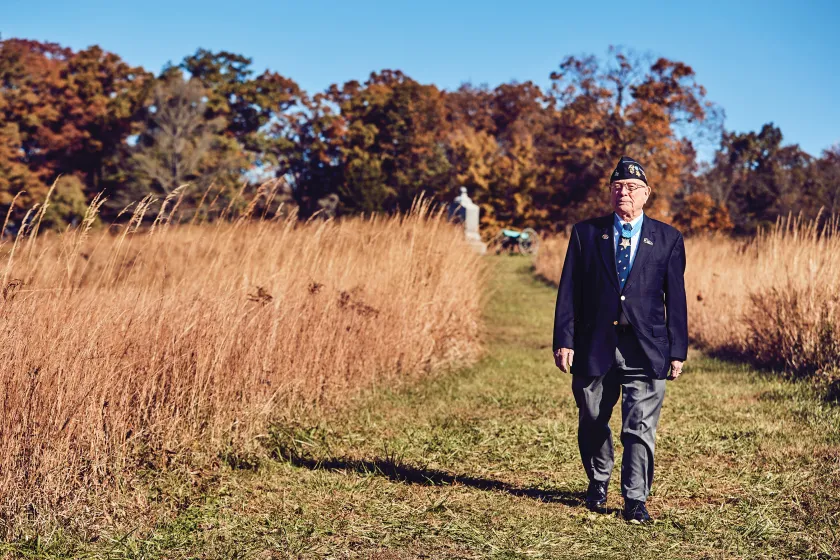
Being at a battlefield where you know that individuals sacrificed their lives is a profound experience. We need these places to keep reminding us of those who gave more than any of us. Around 58 percent of the Medals of Honor that have been awarded for WWII were awarded posthumously. For Iwo, there were 27 Medals of Honor, but only 13 were fortunate enough to get home and receive it personally. We, as a country, can’t forget. We should never forget what their sacrifices have made possible.
Before Woody's passing on June 29, 2022, he was the last surviving Medal of Honor recipient from World War II.
We're on the verge of a moment that will define the future of battlefield preservation. With your help, we can save over 1,000 acres of critical Civil...
Related Battles
23,049
28,063


